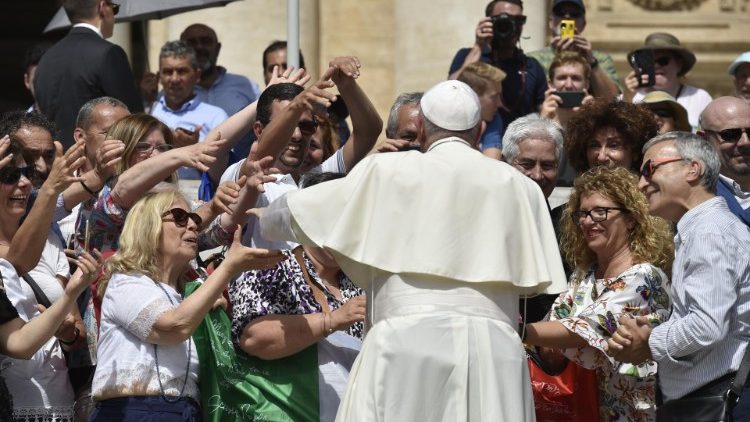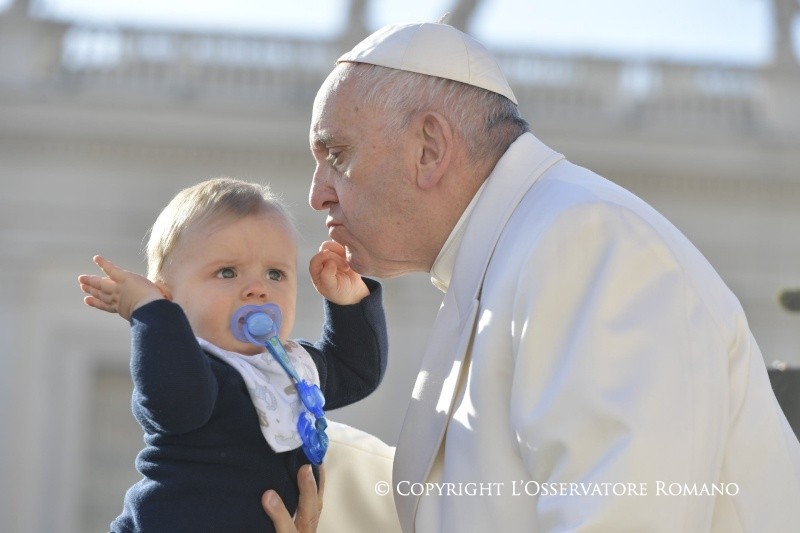
GIÁO HỘI HIỆN THẾ
2019
ĐTC Phanxicô
Giáo Lý về Sách Tông Vụ - Bài 4
Cộng Đồng Kitô Hữu tiên khởi ở Jerusalem - Mẫu Gương cho Các Cộng Đồng Kitô Giáo
Thứ Tư ngày 26/6/2019



Dear Brothers and Sisters, good morning!
The fruit of Pentecost, the powerful effusion of the Spirit of God on the first Christian community, was such that many people felt their heart pierced by the happy announcement — the kerygma — of salvation in Christ and they adhered to Him freely, converting, receiving Baptism in His Name and receiving in turn the gift of the Holy Spirit. About three thousand people formed part of that fraternity, which is the habitat of believers and is the ecclesial ferment of the work of evangelization. The warmth of the faith of these brothers and sisters in Christ made of their life the scenario of the work of God, who manifests Himself with prodigies and signs through the Apostles. The extraordinary becomes ordinary and the everyday becomes the area of the manifestation of Christ alive.
The evangelist Luke recounts it, showing us the Church of Jerusalem as the paradigm of every Christian community, as the icon of a fraternity that fascinates and that is not mythologized or even minimized. The account of the Acts enables us to look between the walls of the house where the first Christians gathered as family of God, area of the koinonia, namely, of the communion of love between brothers and sisters in Christ.
It can be seen that they lived in a very precise way: they were “devoted to the Apostles’ teaching and fellowship, to the breaking of bread and the prayers (Acts 2:42). The Christian listen assiduously to the didache, namely, the apostolic teaching; they practice a high quality of interpersonal relations also through the communion of spiritual and material goods; they remember the Lord through the “breaking of bread,” namely, the Eucharist, and converse with God in prayer. These are a Christian’s attitudes, the four traits of a good Christian.
As opposed to human society, where the tendency is to look after one’s own interests, regardless or even to the detriment of others, the community of believers banishes individualism to foster sharing and solidarity. There is no place for egoism in a Christian’s soul: if your heart is egoistic you’re not a Christian, you are a worldly <sort>, who only seek your favour, your profit. And Luke tells us that the believers are together (Cf. Acts 2:44). Proximity and unity are the style of believers: neighbours, concerned for one another, who do not speak badly of the other, no, <but> help, come close.
The grace of Baptism reveals, therefore, the profound bond between brothers in Christ that are called to share, to identify themselves with others and to give “as any had need” (Acts 2:45), that is, generosity, alms, concern for the other, to visit the sick, to visit those that are in need, who are in need of consolation.
And this fraternity, precisely because it chooses the way of communion and of attention to the needy of this fraternity, which is the Church, can live a true and genuine liturgical life. Luke says: “And day by day, attending the temple together and breaking bread in their homes, they partook of food with glad and generous hearts, praising God and having favour with all the people” (Acts 2:46-47).
Finally, the account of the Acts reminds us that the Lord guarantees the growth of the community (Cf. 2:47): the perseverance of believers in genuine alliance with God and with brethren becomes an attractive force that fascinates and conquers many (Cf. Evangelii Gaudium, 14), a principle thanks to which lives the believing community of all times.
Let us pray to the Holy Spirit so that He makes of our communities places in which to receive and practice the new life, the works of solidarity and of communion, places in which the liturgies are an encounter with God, which becomes communion with brothers and sisters, places that are open doors onto the heavenly Jerusalem.
Đaminh Maria Cao Tấn Tĩnh, BVL, chuyển dịch kèm theo nhan đề và các chi tiết
nhấn mạnh tự ý bằng mầu